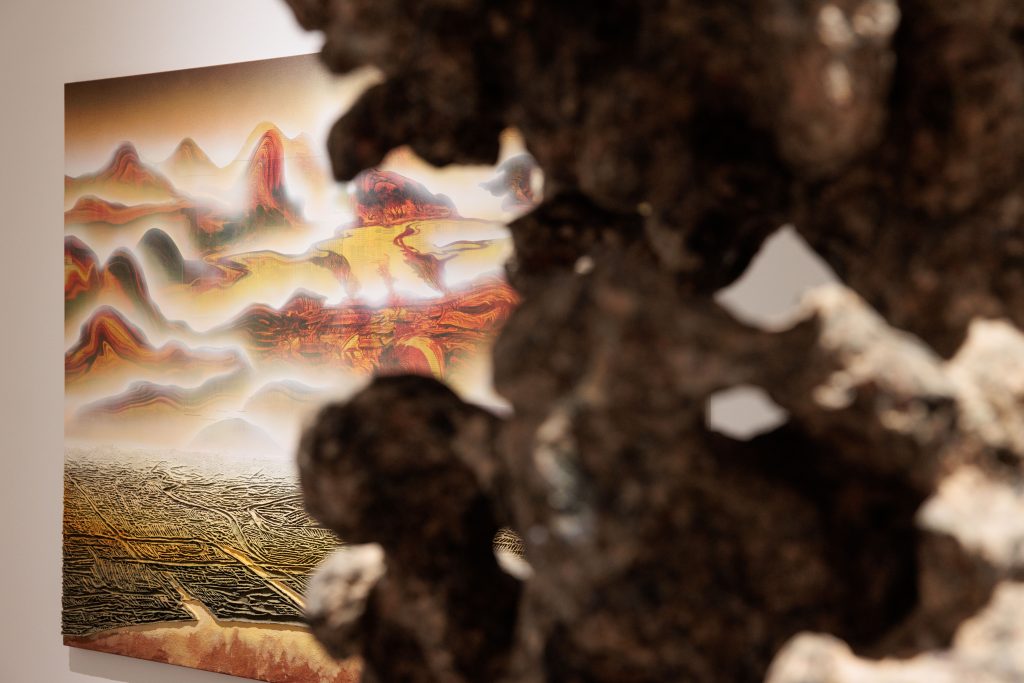This review by Kathryn Wainwright was originally posted on artinliverpool.com
The Garden of Perfect Brightness, by Gordon Cheung, at The Atkinson in Southport is a perfectly realised vision, by an artist who responds to both the history and the physicality of his materials.
Though you wouldn’t know it to look at them, most of the sculptures in this room are built from Financial Times newspapers, which are probably the most commonplace embodiment of ritualistic capitalism in Britain imaginable. As a newspaper, it takes a liberal stance on free markets, aiming to break down barriers in trade between nations. It’s not hellishly awful in that sense, but it does represent a history of an assumed right to trade with, and benefit from the products of, other cultures.
Gordon Cheung uses common phrases to make this work simpler to read, but the most important is that ‘history is written by the victors’. Because this is not a simple attack on capitalism, it is a complex reading of how the version of capitalism we live by in the modern world was built on the misuse and appropriation of culture – specifically Chinese identity.
A recent project in Liverpool, commissioned by Liverpool BID Company for Liverpool Biennial that saw recreations of blue and white porcelain, printed onto paper cups, offers context to this show at The Atkinson.
The cups were given away as vessels for coffee at Ropes & Twines and a few other cafés around the city. They were adorned with cormorants, standing gracefully on rocks, and skewed into glitch art, which enhanced their connection to traditional Chinese ceramics.
Those cups, and that history of Chinese ceramics and culture, and how innately it is now informing our own, are the backbone for the ideas behind The Garden of Perfect Brightness, which pushes the artists’ critique of modern capitalism and the shadows of imperialism, into a more focussed series of sculptures.
The embodiment of the exhibition is an abstract recreation of a Chinese garden, where light and empty space hold a significant energy between sculptural objects, living bodies, and inanimate architecture. That unmistakable identity of Chinese garden design is presented using materials and, literally, the ideas and text of Western culture.
The spirit stones (Gongshi: 供石) that appear as sculpture in traditional Chinese gardens are rocks that were originally taken from natural sources, and mounted on plinths to appreciate their form. Their hollows were given practical uses, as viewing guides or paint brush holders, and they ranged in size from a few inches tall to a few metres.
The spirit stones, sculpted by Gordon Cheung from Financial Times newspapers, are an embodiment of the world as it is now, reflecting with more energy on finance and data, than on the bridges between nature and civilisation that these stones were meant to represent.
Large scale paintings and small scale wall-sculptures provide context for the potent central stones, but they also offer a hint at the physical skill that has gone into this exhibition. The history of the materials is important to this exhibition. But, it’s the understanding of the physicality of these materials, and Gordon Cheung’s ability to perfectly manipulate them into not just the forms, but the cultural references he’s aiming for, that brings it to life.
—
Gordon Cheung: The Garden of Perfect Brightness is open at The Atkinson, Southport until 9th September and is part of Independents Biennial 2023
Words, Kathryn Wainwright
Posted on 11 July 2023 under Exhibition, General news







